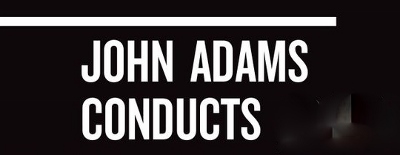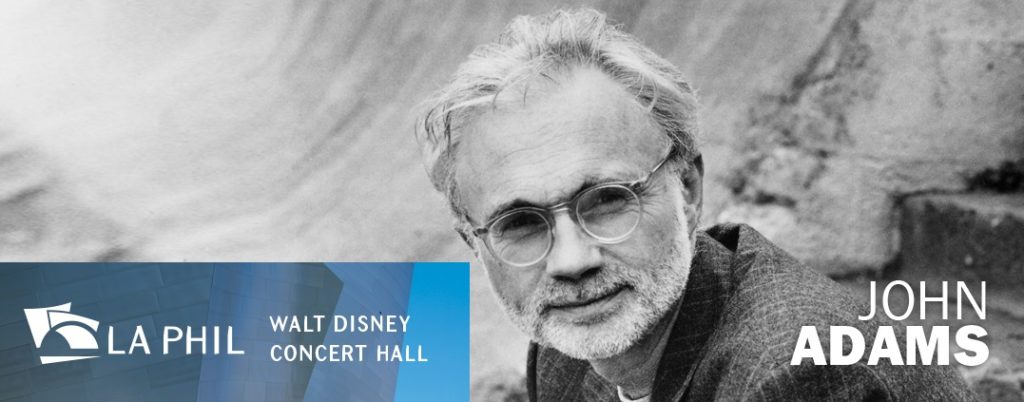A JUICY MCINTOSH
What used to feel like the LA Phil’s token new music series seems to finally be hitting its stride. Green Umbrella is trending up thanks to a massive new commission budget and Los Angeles’s sudden role as new music tastemaker. Last Tuesday’s concert was the latest in what seems like a constant and city-wide lineup of excellent contemporary programming, despite a last-minute substitution.
Due to the composer/performer’s illness, the originally scheduled Katherine Young solo bassoon premiere was replaced by a percussion quartet by Anna Thorvaldsdottir. A subdued prelude, Aura was exclusively lit by what seemed like green LED gloves — that also sent emerald shafts of light into the well-sold venue — as the Los Angeles Percussion Quartet (Cory Hills, Nick Terry, Dustin Donahue, Derek Tywoniuk) brushed and glanced and bowed what seemed like every percussion instrument in Disney Hall. The result was extemporaneous and pleasant, segueing neatly to Andrew McIntosh’s Apollonian premiere.
McIntosh lives something of a double life; between performing in the local darling wildUp and landing premieres with the new face of opera, The Industry, McIntosh has made his claim on a slice of L.A.’s new music culture. February 20th’s world premiere of his Shasta was a clean tasting menu of pruned intervals: eleven brass pieces swelled and plodded through a neat set of chords methodically clashing or blending their organic sound with a tempered foil of keyboard, harp, timpani and percussion. John Adams was as ascetic as the music, simply beating time and controlling the atmosphere. This is not to say it was dull: actually there was an underlying joy to the neatness of it all, a clear intellect simply cherishing harmony.
Julius Eastman has been made recently relevant amid the timely arrival of identity politics in the ivory tower of New Music. Besides a recent performance of the same piece across the street at Monday Evening Concerts, Eastman has been a topic in The New York Times, equally for his music and his tragic story — he died anonymous and homeless at age 49. (Eastman is quoted as saying, “What I am trying to achieve is to be what I am to the fullest…black to the fullest, a musician to the fullest, a homosexual to the fullest.”)
Adams himself introduced the second half. In addition to framing the piece’s politics, Adams played a clip of the Eastman speaking at Northwestern about the piece:
https://www.youtube.com/watch?v=E2XtFZMpwm0&t=79s
This was a very welcome addition, not just for the pleasure of hearing the composer’s voice but also for his eloquence on the topic of his own music. Eastman stipulates that Evil Nigger has no instrumentation but Tuesday’s rendition featured the very capable pianists Dynasty Battles, Michelle Cann, Joanne Pearce Martin and Vicki Ray. Using the same score, each player articulated a quick three-note germ then vamps in response to the other members. That repeated nearly ad nauseam until a new slightly evolved section unfolded, resetting the process. In typical minimalist fashion the result is locomotive, a slowly accumulating out of phase mass of sound. While not programmatic in a Romantic sense, assigning a notion like Evil Nigger to such relentless monolithic sound was staggering.
A welcome bedfellow to the Eastman, though more political and anti-war, Salvatore Martirano’s L’s G.A. (for Lincoln’s Gettysburg Address) was written in 1967 explicitly for “gassed-masked politico, helium bomb, 3 16-mm movie projectors and 2-channel tape recorder.” The Phil’s version, realized by composer Sean Griffin, was mostly horrifying and slightly funny: A lone figure (queer masochist performance artist Ron Athey as the “Politico”) babbled a modified version of the actual Gettysburg Address clad in a gas mask and three piece suit. Meanwhile, spooky electronics glitched and hissed to a likewise lewd and creepy film, circa 1969, by Ron Nameth (who made an equally experimental document of Andy Warhol’s Exploding Plastic Inevitable two years before). Together the conception absolutely reflected the famous Village Voice’s original assessment: “terrifying, clear, and a mixed-media classic.”
Mr. Griffin’s direction and choice of artist is a somewhat modern parallel to the composer; Athey has been blacklisted and shunned in many of the same ways Martirano was during his life. The performance seemed to channel the transgressive spirit of both the work and composer, ultimately re-conceptualizing a protest piece forged during the heat of the Vietnam War for today’s uncertain political landscape.
The Phil is indeed prioritizing new music and local talent. Andrew Mcintosh is now not a stranger, Julius Eastman is thankfully being “discovered” and Sean Griffin and Ron Athey get the kind of spotlight they deserve.
______________________________________________
photos courtesy of LA Phil
Eastman’s intro to the Northwestern University concert from Julius Eastman: Unjust Malaise (#80638-2) © 2005 Anthology of Recorded Music
Adams Conducts McIntosh World Premiere
Los Angeles Philharmonic’s Green Umbrella series
Walt Disney Concert Hall
played February 20, 2018
for future events, call 323.850.2000 or visit LA Phil


